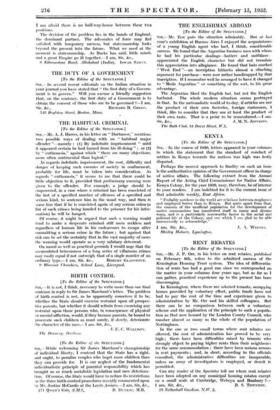THE HABITUAL CRIMINAL
[To the Editor of the SPECTATOR.] SIIL—Mr. A. J. Hawes, in his letter on " Dartmoor," mentions two possible ways of dealing with an "- habitual major offender "—namely : (1) By indefinite imprisonment " until it appeared certain he had turned from his ill-doing " ; or (2) by " euthanasia," against which " there are many objections, more often sentimental than logical."
As regards indefinite imprisonment, the cost, difficulty and danger of keeping such enemies of society in confinement, probably for life, must be taken into consideration. As regards " euthanasia," it seems to me that there could be little objection to it, provided that preliminary warning were given to the offender. For example,- a judge should be empowered, in a ease where a criminal has been convicted of the last of a specified number of offences of a specified and serious kind, to sentence him in the usual way, and then to warn him that if he is convicted again of any serious crime (a list of such crimes being handed to the prisoner for his infor- mation) he will be hanged.
Of course, it might be argued that such a warning would lend to snake a desperate criminal still more reckless and regardless of human life in his endeavours to escape after committing a serious crime in the future ; but against that risk can be set the certainty that in the vast majority of cases Ilse warning would operate as a very salutary deterrent.
On moral as well as practical grounds I would urge that the accumulated heinousness of a long series of villainous crimes may easily equal if not outweigh that of a single murder of an






































 Previous page
Previous page